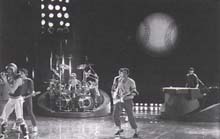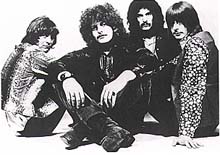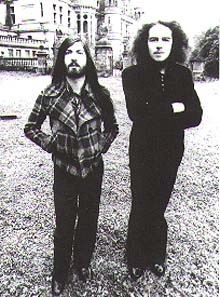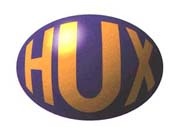 |
THE TUBES captured the imagination
of the British public in 1977 when they were forced to tone down their stage
show by the local government authority in London. Word got out that the "Mondo
Bondage" Tour was perverse and depraved. However, the publicity did them
no harm and they established themselves as an essential "live" act during
this period with characters like "Dr Strangekiss" and "Quay Lewd" adding
spice to their theatrical show.
The group were formed by vocalist Fee Waybill with guitarist Bill Spooner and college friends Vince Welnick(Keyboards), Michael Cotten (synthesizer), Roger Steen (guitar), Rick Anderson (bass), Prairie Prince (drums) and Re-Styles (dancer). Their music - as reflected on their Al-Kooper produced debut in 1975 - was loud and brash but the early albums never quite lived up to the stage act which was subsequently immortalized on the double-album "What Do You Want From Life". By the time of the BBC concert recording in 1981 their wild stage show had been somewhat tamed and, as reflected in the later albums "Remote Control" (1979) and "The Completion Backward Principle" (1981), the music moved away from punk to finely-sheened AOR with production by Todd Rundgren and David Foster respectively. The band finally folded in 1984. Waybill went on to write songs for AOR balladeer Richard Marx amongst others. Although the rest of the band continued to tour under The Tubes name, Bill Spooner and Vince Welnick spent some time with The Grateful Dead. Re-Styles became a landscape gardener.
|
 |
MICK ABRAHAMS
played a big role in launching rock giants Jethro Tull but when musical
and personal differences with Ian Anderson came to a head in late 1968 he
left Tull to form Blodwyn Pig. This band followed the early-Tull sound mixing
jazz and blues-rock and characterised by the flute and sax playing of Jack
Lancaster.
Commercially, Blodwyn Pig were a big success with their first two albums making the Top 10, in 1969 and 1970 respectively. However the first line-up of the band folded in 1970 (it also included Andy Pyle on bass and Ron Berg on drums). Mick Abrahams then formed the "Mick Abrahams Band" in 1971 only to leave the music business completely. In 1974 he was lured back with the latest Blodwyn Pig line-up featuring drummer Clive Bunker (also from the original Tull band). This incarnation did manage to record a BBC session for John Peel and an "In Concert". Again Mick Abrahams called it quits, and subsequently found religion and a "proper" job. It wasn't until 1988 that the Pig reformed for a one-off charity gig. This time the band included Andy Pyle and Clive Bunker joined by Bruce Boardman and legendary sax-player Dick Heckstall-Smith. Since then there have been a string of albums, always highlighting the quality of Abrahams' guitar and song-writing ability. Most recently he put together the "This Was" band touring the UK and recreating the sound of early Jethro Tull.
|
 |
A definite Celtic influence coloured the mainly acoustic music of Dubliners Leo O'Kelly (guitar/violin/vocals) and Sonny Condell (guitar/percussion/vocals) who formed TIR NA NOG in 1970. Condell had previously entered the Irish Top 10 with "Tram Car 88" when a member of his cousin's group. With O'Kelly, the duo's early '70s output for Chrysalis, including a Melody Maker Single Of The Week in "The Lady I Love," established a cult reputation which was perpetuated by support slots to label stablemates, including Jethro Tull, Procol Harum and Steeleye Span. This remained enduring enough to sustain a comeback on Britain's folk club circuit 17 years after their split in 1974. In their latter years Tir Na Nog experimented with a drummer, electric bass guitarist and the keyboards of Matthew Fisher. |
|

